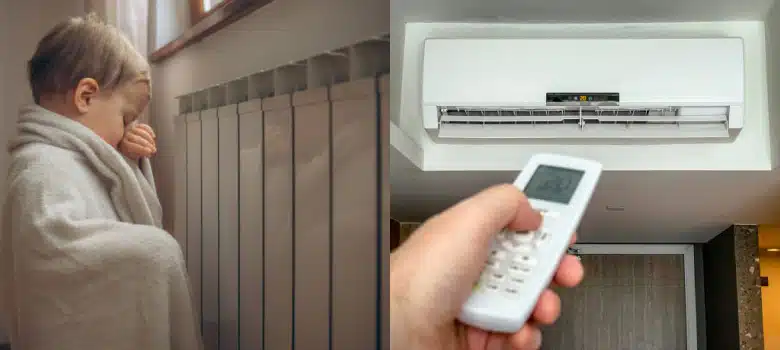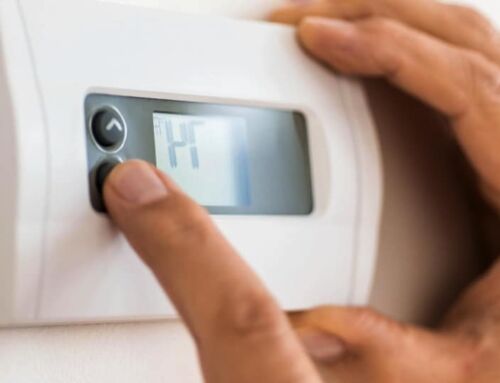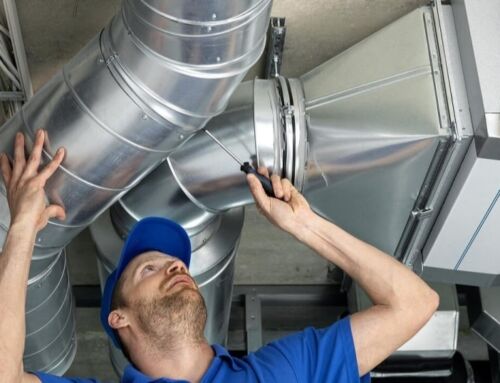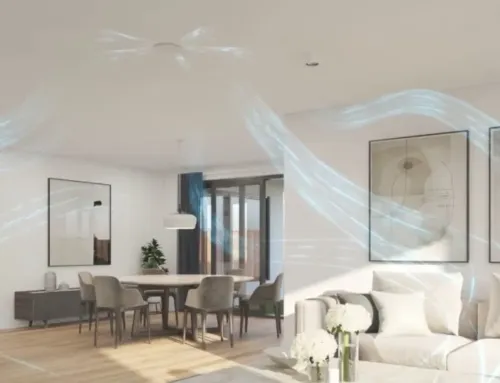Are you tossing up between a gas heater and an air conditioner for your home comforts?
Let’s delve into this classic Aussie conundrum. On one side, we have gas heaters, the traditional champions of cosy warmth, offering efficient heating that’s particularly effective during those nippy winter months.
In this guide, we’ll cover:
- Pros and cons of gas heaters and air conditioners
- A detailed comparison of both options
- Incentives and warranties
- Installation Considerations
These units are known for their ability to quickly heat a room, providing a snug refuge from the chilly outdoors.
On the flip side, air conditioners are the cool heroes of the Australian summer, offering a breezy escape from the scorching heat.
Not just for cooling, many modern air conditioners also come with heating functions, making them a versatile choice for year-round climate control. Their ability to filter and dehumidify the air adds an extra layer of comfort, particularly in humid conditions.
In this article, we’ll compare these two popular choices – gas heaters and air conditioners – in the context of Sydney’s unique climate. We’ll explore the pros and cons of each, including aspects like energy efficiency, cost-effectiveness, environmental impact, and suitability for different types of homes.
By the end, you’ll have a clearer understanding of which option might best suit your needs, lifestyle, and budget. Ready to find your perfect home climate solution? Let’s get started.
| HUNTERCON SUMMARY:
Gas Heaters:
Air Conditioners:
|
Heating & Cooling Showdown: Gas Heaters vs Air Conditioners
Gas Heaters: The Toasty Traditionalists
Gas heaters are renowned for their rapid heating ability and consistent warmth. They work by burning natural gas to generate heat, which is then circulated throughout the room.
Pros:
- Quick Heating: Gas heaters warm up a space much faster than most electric heaters.
- Cost-Effective: Generally more cost-efficient in terms of running costs, especially for larger spaces.
- Reliable: They don’t rely on the outside temperature to operate efficiently, making them ideal for colder nights.
Cons:
- Installation Costs: Can be expensive to install, particularly if your home isn’t already connected to natural gas.
- Safety Concerns: They emit a small amount of carbon monoxide and require good ventilation to avoid health risks.
- Environmental Impact: Burning gas releases greenhouse gases, which contribute to climate change.
Air Conditioners: The Versatile Ventilators
Air conditioners, particularly reverse-cycle models, provide both cooling and heating solutions. They operate by extracting heat from the air inside (for cooling) or outside (for heating) your home and are known for their versatility.
Pros:
- Year-Round Comfort: Capable of both heating and cooling, making them a versatile option.
- Air Quality: Often include filters to improve indoor air quality, reducing allergens and dust.
- Control and Convenience: Modern units come with features like timers, remote control, and smart home integration.
Cons:
- Initial Cost: This can be expensive to purchase, especially for higher-efficiency models.
- Running Costs: Heating mode can be more expensive compared to gas heating, particularly in colder conditions.
- Maintenance: Requires regular maintenance to keep operating efficiently and to maintain air quality.
Air Conditioning Installation Process
Both gas heaters and air conditioners have their unique strengths and drawbacks. The best choice depends on your specific needs, the size of the space you’re looking to heat or cool, and your priorities in terms of cost, environmental impact, and convenience.
Choosing Your Climate Companion: A Detailed Comparison
When it comes to selecting the right temperature control for your home in Sydney, several key factors come into play. Let’s break down these factors for both gas heaters and air conditioners to help you make an informed decision.
Efficiency:
- Gas Heaters: Typically more energy-efficient for heating alone, as they convert most of the energy used into direct heat.
- Air Conditioners: Modern reverse-cycle units are quite efficient in both heating and cooling modes, but may use more energy than gas heaters in heating mode.
Cost:
- Gas Heaters: Lower ongoing running costs, especially in areas with access to natural gas. However, installation can be costly.
- Air Conditioners: Higher initial purchase price and the running cost for heating can be higher than gas heaters. The cost-effectiveness is better when considering both heating and cooling capabilities.
Durability and Lifespan:
- Gas Heaters: Generally robust with a long lifespan, particularly if well-maintained.
- Air Conditioners: With regular maintenance, modern units can last many years, although their lifespan might be slightly shorter than that of gas heaters.
Aesthetics:
- Gas Heaters: They come in various designs, from traditional to contemporary, but they’re often more obtrusive than air conditioners.
- Air Conditioners: Sleeker and more discreet, especially split systems, and can blend into the decor more seamlessly.
Environmental Impact:
- Gas Heaters: Emit greenhouse gases and require good ventilation for safety, making them less environmentally friendly.
- Air Conditioners: Some environmental impact due to power consumption, but newer models are increasingly eco-friendly with reduced greenhouse gas emissions.
Installation and Maintenance:
- Gas Heaters: Installation can be invasive, requiring gas lines. Regular maintenance is needed for safety and efficiency.
- Air Conditioners: Easier to install, especially split systems. Maintenance is crucial for efficiency and air quality.
Climate Suitability:
- Gas Heaters: Ideal for colder climates or homes that require quick, efficient heating.
- Air Conditioners: Better for homes that experience both hot and cool periods, offering more versatility.
Health and Safety:
- Gas Heaters: Risks associated with gas leaks and carbon monoxide emission. Requires good ventilation.
- Air Conditioners: Generally safer but can circulate dust and allergens if not regularly cleaned.
By considering these factors, you can choose the best option that aligns with your preferences, home requirements, and lifestyle needs.
Whether it’s the cozy warmth of a gas heater or the versatile comfort of an air conditioner, your choice will define your living comfort for years to come.
Warming Up with Incentives and Warranties
When it comes to heating and cooling options in Sydney, it’s crucial to consider not only the features and efficiency but also the available government incentives and warranties. Let’s take a look at what’s on offer for gas heaters and air conditioners.
Government Incentives for Gas Heaters:
The NSW Gas Rebate is a significant incentive offered to eligible concession cardholders. It provides financial assistance to help pay for natural gas or bottled Liquefied Petroleum Gas (LPG) bills.
For the financial year, the rebate amounts to $121 per household for those on an embedded network or using bottled LPG.
Eligibility criteria include being the account holder and holding a valid concession card, such as a Pensioner Concession Card or Health Care Card.
The rebate is available for residents of NSW who meet certain requirements, such as using more than 45 kg/88 L of bottled LPG for household needs.
The application process is straightforward and can be done online or via post with the necessary documentation.
Government Incentives for Air Conditioners:
The Energy Savings Scheme (ESS) in NSW includes incentives for the installation of energy-efficient air conditioning systems.
The scheme aims to reduce electricity consumption and greenhouse gas emissions by encouraging the use of efficient heating and cooling solutions.
Eligibility for these incentives can vary depending on the specific type and model of the air conditioner, as well as other factors.
The ESS provides a way to estimate the number of certificates you can receive for eligible upgrades, which can then be translated into financial benefits.
This scheme is a part of the broader Energy Security Safeguard initiative, which encompasses various measures to promote energy efficiency in NSW.
Warranties:
When it comes to warranties, both gas heaters and air conditioners typically come with manufacturer warranties. The length and coverage of these warranties can vary significantly based on the brand and model.
It’s important to check with the manufacturer or retailer for specific warranty details, including the duration of coverage and what is included.
While gas heaters have direct rebates available, air conditioners are supported under the Energy Savings Scheme which promotes energy-efficient models.
Both options come with their respective warranties, and it’s advisable to review these details when making your purchase. This comparison of incentives and warranties should help in making a more informed decision tailored to your needs in Sydney.
Tailoring Temperature Solutions: Installation Considerations
When deciding between a gas heater and an air conditioner for your Sydney home, the type of installation you require can significantly influence your choice.
Each option is better suited to different installation scenarios, and understanding these can guide you towards the right decision for your specific situation.
Gas Heaters: Best for Existing Gas Connections
- Ideal for Homes with Existing Gas Lines: If your home already has a natural gas connection, installing a gas heater can be relatively straightforward and cost-effective.
- New Installations: For homes without existing gas connections, installing a gas heater can be more complex and expensive, as it requires laying gas pipes and ensuring proper ventilation.
- Space Considerations: Gas heaters are available in various sizes and types, including wall-mounted units and freestanding models, making them suitable for different room sizes and layouts.
Air Conditioners: Versatile and Less Invasive
- Ease of Installation: Air conditioners, especially split systems, are generally easier and less invasive to install than gas heaters. They are ideal for homes without existing gas lines.
- Flexibility: Air conditioners come in various forms – window units, portable, split systems, and ducted systems – offering flexibility based on your home’s design and space availability.
- Aesthetic Impact: Modern air conditioners are designed to blend into your home decor, often being less obtrusive than some gas heaters.
What Size Air Conditioner Do I Need?
For Renovations or New Builds:
- Gas Heaters: If you are building a new home or undergoing major renovations, incorporating a gas heating system can be more seamlessly integrated into the design.
- Air Conditioners: For new constructions or renovations, you have the opportunity to install ducted air conditioning systems, which are discreet and can provide climate control for the entire home.
Heritage Homes and Rental Properties:
- Gas Heaters: These may be more suitable for heritage homes where preserving the original structure and aesthetics is important, as they can sometimes be installed without significant alterations.
- Air Conditioners: Portable or window air conditioning units can be a good choice for rental properties or homes where permanent installations are not feasible.
Your choice between a gas heater and an air conditioner in Sydney should be influenced by your home’s existing infrastructure, the scale of installation you’re prepared for, and the type of property you have.
Gas heaters are ideal for homes with existing gas connections or those undergoing major renovations.
Air conditioners offer flexibility and are less invasive, making them suitable for a wide range of homes, including rentals and properties where permanent installations are not desired.
By considering these installation aspects, you can choose the option that best fits your home’s needs and your circumstances.
Wrapping Up: Making the Right Climate Choice for Your Home
As we conclude our comprehensive exploration of gas heaters and air conditioners in Sydney, let’s recap the key takeaways to aid you in making the best choice for your home’s heating and cooling needs.
Gas Heaters: The Warm Embrace
- Pros: Quick heating, cost-effective for larger spaces, and reliable performance in colder temperatures.
- Cons: Higher installation costs, potential safety concerns due to carbon monoxide emissions, and a larger environmental footprint.
Air Conditioners: The Cool Breeze of Versatility
- Pros: Year-round comfort with both cooling and heating options, improved air quality through filtration, and advanced features like smart home integration.
- Cons: Higher initial costs and maintenance requirements, and potentially higher running costs for heating.
How Long Does an Air Conditioner Take to Install?
Making Your Choice:
- Consider Your Home Setup: If you have an existing gas connection, a gas heater might be a more economical and efficient choice. However, if you’re looking for versatility and your home lacks a gas connection, an air conditioner, especially a reverse-cycle model, might be the better option.
- Factor in Installation and Running Costs: Gas heaters generally have lower running costs but can be more expensive to install. Air conditioners might have higher running costs but offer cooling benefits and are less invasive to install.
- Think About Environmental Impact: If you’re environmentally conscious, modern air conditioners with eco-friendly refrigerants and energy-efficient designs may be more appealing than gas heaters.
Choosing between a gas heater and an air conditioner depends largely on your individual needs, the structure of your home, and your priorities in terms of cost, convenience, and environmental impact.
By carefully weighing these factors, you can select the option that not only keeps your home comfortable but also aligns with your lifestyle and values. Remember, the right choice is the one that best suits your unique situation in Sydney.
Ready to Heat or Cool Your Home? Contact Us!
You’re now armed with all the info you need to decide between a gas heater and an air conditioner for your Sydney home. But we know that making the final choice can still be daunting. That’s where we come in!
Take the Next Step with Huntercon Electrical and Air
- Get Personalised Advice: Every home is unique, and so are your heating and cooling needs. Our team at HunterCON Electrical and Air is ready to provide tailored advice that takes into account your specific situation.
- Receive a Custom Quote: Whether you’re leaning towards a gas heater or an air conditioner, we can provide a detailed quote that considers installation, running costs, and efficiency.
- Expert Installation and Service: Our experienced professionals ensure that whichever system you choose is installed with the highest standards of quality and service.
Don’t leave your comfort to chance. Contact HunterCON Electrical and Air today for a consultation and quote that will bring the perfect climate control into your home.
Whether it’s the cosy warmth of a gas heater or the cool ease of an air conditioner, we’re here to help you make the best choice for your lifestyle.
Reach Out Now!
- Request a free quote
- Give us a call: 02 8283 1105
Your ideal home comfort is just a call or click away with HunterCON Electrical and Air. Let us help you create the perfect atmosphere in your Sydney home!







Leave A Comment